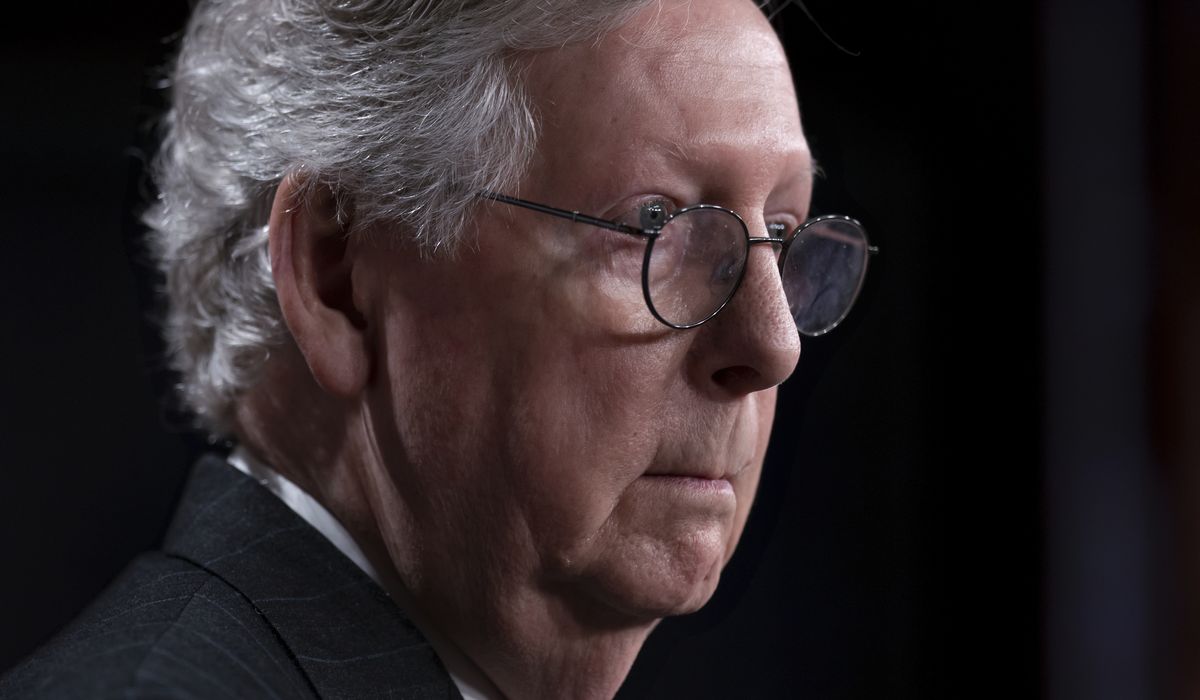
Senate Minority Leader Mitch McConnell floated on Wednesday the possibility of allowing Sen. Joe Manchin III to keep his committee chairmanship in a party-switch deal that would give Republicans majority control of the upper chamber.
Mr. McConnell, Kentucky Republican, said during an appearance on Hugh Hewitt’s radio show that the GOP had been courting the West Virginia Democrat to defect for some time. While prior attempts failed, Mr. McConnell said Mr. Manchin’s opposition to the White House’s $1.75 trillion social welfare and climate change bill has created a new opportunity.
“I think what Manchin is discovering is that there just aren’t any Democrats left in the Senate that are pro-life and terribly concerned about debt and deficit and inflation,” said the GOP leader. “So he feels like a man alone. If he were to join us, he’d be joining a lot of folks who have similar views on a whole range of issues.”
Mr. McConnell added that a party-switch deal could be enhanced by assurances that Mr. Manchin would keep his chairmanship of the Senate Energy and Natural Resources Committee.
“He, I’m sure, enjoys being chair of the committee,” said Mr. McConnell. “It’s important to West Virginia. And all of those things are things we’ve discussed.”
Mr. Manchin has led the energy panel since January when Democrats took control of the 50-50 Senate thanks to the tie-breaking vote of Vice President Kamala Harris. The chairmanship is especially valuable to Mr. Manchin given the leading role that coal and natural gas play in West Virginia’s economy.
“We’d be thrilled to have another coal-state Republican who understands blue-collar concerns in the conference,” said Sen. Cynthia Lummis, Wyoming Republican.
Mr. Manchin’s office did not respond to requests for comment.
At the moment, Wyoming Sen. John Barrasso is the ranking Republican on the Energy Committee. If the Senate were to fall into GOP control, Mr. Barrasso would be next in line to chair the panel.
Mr. Barrasso also serves as chairman of the Senate Republican Conference and is considered a top contender for GOP whip should the incumbent, Sen. John Thune of South Dakota, not seek reelection in 2022.
Mr. Manchin could make leading the committee a requirement for his party-switch, though such a deal would be nonbinding.
Recent history shows such deals can both be beneficial and acrimonious.
In 2001, Vermont Sen. Jim Jeffords left the GOP to become an independent and caucus with Democrats. The move shifted control of the evenly divided Senate to Democrats. As part of the deal, Mr. Jeffords was allowed to remain as chairman of the Senate’s Health, Education and Labor Committee.
Democrats also allowed him to take the chairmanship of the Senate’s Environment and Public Works Committee.
While the switch worked to Mr. Jeffords’ benefit, party-switch deals could go either way.
In 2009, Pennsylvania Sen. Arlen Specter left the Republican Party ahead of a difficult primary. His defection gave the Democratic Party 60-votes in the Senate.
As part of the deal, Mr. Specter was promised by Democratic leadership that he would keep his seniority on several high-profile Senate committees, including judiciary and appropriations. After the switch, Democrats reneged on the deal, allowing Mr. Specter to sit on the committees but as a junior member.








